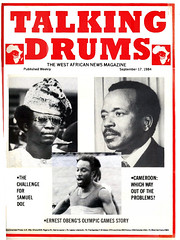Frankie goes where?
A Touch Of Nokoko by Kofi Akumanyi
So, who's this Frankie who has generated such ire in the above quoted reader? Only a moron would say he has not been in some form of contact with him. Still, since when it comes to the raucous type of music which the older generation tend to frown upon, there are many self-confessed morons, I am willing to reveal that Frankie is a member of London-based pop group with the most unlikely full name of "Frankie goes to Hollywood".
Much as this name attracts attention because unlike other nomenclatures adopted by pop groups, it is a full sentence, their music is a little difficult to swallow - except, of course, if you are a fan.
For the past four months, the release of the bands' first single called 'Relax' invaded the radio and television air- waves of the United Kingdom after there. Radio One Disc Jockey, Mike Read and other BBC DJs had banned it because of its naughty lyrics.
That opened the floodgates for records buyers whose devotion ensured that 'Relax' stayed in the Charts for over six weeks in June for, the music industry had long learnt that there is nothing more attractive than dirty lyrics to keep the records sellers' till bells ringing.
With perfect timing, the record company released 'Two-Tribes' a follow- up which was a song about evils of war. According to experts on record sales it was probably the video of 'Two-Tribes' which did it as it satirized Presidents Reagan and Chernenko in a fierce punch-up. Predictably, some people complained about the violence, but one member of the group said: "People shouldn't take us too seriously. Our main aim is to entertain. Our music is about having a good time."
However, the best part of the "Frankie goes to Hollywood drama which I personally found very intriguing, was the clever management (or is it manipulation?) which accompanied these apparently successful releases and made "Frankie" a household name with the youth. Within days t-shirts appeared on the markets, with huge lettering of RELAX printed diagonally across the chest. Aided by the fine summer weather, the aficionados bought and wore them all over the place with variations which included "Frankie says RELAX" and (wait for it) "Who cares what FRANKIE says?".
Everything considered, the angry reader who complained about the Frankie culture which has assaulted the ears and eyes everywhere he turns, is justified..
But I am thinking of how our over- exploited and mostly impoverished African musicians could borrow a few techniques from the book of "Frankie goes to Hollywood" to improve their image and pockets. I do not know whether the music industry has changed much in Africa but I could very well imagine how a situation like that would have been handled by the authorities if it had happened over there.
First, for a song with supposedly sexual overtones, substitute something which could be interpreted into political terms. In the Ghanaian context, many of the musicians with the gift of words and steeped in local folklore often weave beautiful stories into songs that basically deal with everyday problems of life.
As all clever record producers know the radio is the best medium for publicising the music, therefore the Disc Jockey in an African country would be the first to play the song on their programmes. The public would soon pick it up, buy the records and dance to the music in the dance halls and discos. One day, the popular song would disappear as quickly as it came on the scene.
"I haven't heard the song of the day this week. What's happening?" I ask the local DJ.
"You mean you don't know that the song has been banned?"
"Banned? By whom?"
"According to the circular letter to all Disc Jockeys of the National Radio, from the Director, the lyrics are likely to corrupt the morals of the youth and thereby undermine the solid moral fabric..." the DJ reads a copy of the letter.
"I can't believe this. Yaa Amponsah is really an old song. It is the very basis of the popular high-life music right along the West African coast."
"It is, except that they say the new interpretation being put on the lyrics has made it a political protest song."
"And what is the interpretation?"
"You're not going to believe this. They say the lyrics are now interpreted to mean the government is now disillusioned with its political affiliation (marriage?) and is being enticed by a 'new lover' with opposing political views," the DJ explains.
"It's unbelievable! They've banned the song because of this silly reason? O.K. but I still think the Recording Company can do roaring business because this will boost record sales," I say.
"Not bloody likely. The record pressing plant has also been shut down.”
"I suppose that has also 'political meaning'..
"You're spot on. Nothing is done in Africa without politics."
